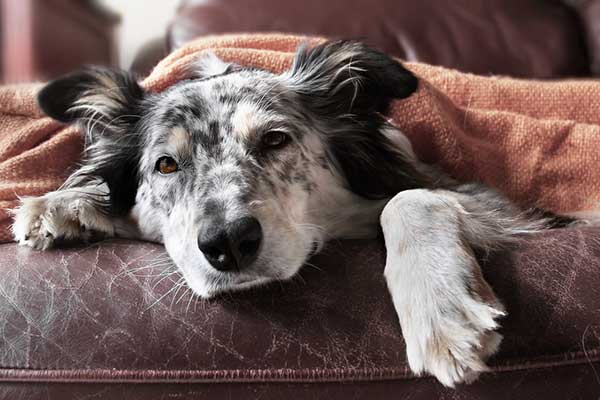Signs of digestive disorders in dogs can be the followings:
- Vomiting or regurgitation
- Constipation (as a result of eating bones)
- Diarrhea
- Colitis (straining to pass loose feces containing mucus and blood)
- Altered stools (either in color, frequency, or consistency)
- Weight loss
Minor stomach upsets are common in dogs, who are always ready to grab forbidden food. Having a good gag reflex, they usually vomit up anything unsuitable. Occasionally, more serious gastric problems can arise.
Obstruction
A brief bout of vomiting usually means a short-lived stomach upset. Repeated vomiting may indicate a foreign body, such as a bone or a child’s toy, blocking the stomach or intestine.
If the object is in the stomach, the dog can appear quite normal; a dog with an intestinal obstruction looks uncomfortable, standing crouched over a painful abdomen.
This condition needs rapid investigation. A small foreign object may be retrieved from the stomach via an endoscope passed down the throat. Otherwise, surgery is needed. During recovery, the dog needs light food, such as chicken with boiled rice.
Obstru ction due to “bloat” is a medical and surgical emergency. In this condition, gas accumulates in the stomach causing bloating (gastric dilatation) and sometimes twisting of the stomach (volvulus). Large deep-chested breeds like the Great Dane are particularly prone to this disorder.
ction due to “bloat” is a medical and surgical emergency. In this condition, gas accumulates in the stomach causing bloating (gastric dilatation) and sometimes twisting of the stomach (volvulus). Large deep-chested breeds like the Great Dane are particularly prone to this disorder.
Your dog should be seen by a vet as soon as possible if he is restless, retching, and drooling, especially after eating, and has a distended abdomen.
To help avoid bloat, your dog should rest, and avoid drinking much water for an hour before or after eating. Feeding several small meals throughout the day also helps ease the symptoms.
Constipation is another form of obstruction, which may cause a dog to lose his appetite and even vomit. Treatment depends on the underlying cause (for example. eating bones) and the severity of the constipation. If laxatives are ineffective, an enema will be given under general anesthetic.
Diarrhea
Sudden change in diet is a very common cause of diarrhea in dogs. Introduce any new food to your doing by mixing it with his usual meals in ever-increasing proportions, giving the natural gut flora time to adjust.
Most adult dogs are lactose intolerant and will have diarrhea if they drink cows’ milk. Less common is intolerance to gluten, the protein found in wheat, which also causes diarrhea and weight loss. Blood tests and diarrhea clearing up on a trial gluten-free diet confirm the diagnosis.
Pancreatic Problems
The pancreas produces important digestive enzymes, but if it fails to produce enough the result will be a ravenous dog with diarrhea and weight loss. Pancreatic function is checked by blood tests, and missing enzymes will be replaced with dietary supplements.
A more serious illness is inflammation of the pancreas (pancreatitis). A high-fat meal is a common trigger, such as eating suet left out for wild birds. Symptoms may be vague but can include intermittent vomiting and acute abdominal pain and swelling.
Blood tests and an ultrasound scan confirm the diagnosis. Treatment includes pain relief, anti-nausea medication, and hospitalization for intravenous fluid therapy.
Dangers of Dehydration
Small dogs and puppies in particular can become dehydrated and weak from recurrent vomiting and diarrhea within a matter of hours and, at worst, may need to be hospitalized and given fluids intravenously.
If you are at all concerned about a dog or puppy with gastroenteritis, contact your vet as early as possible.

